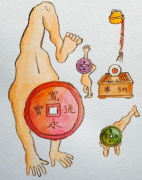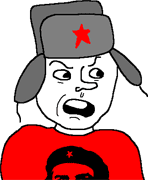|
Wheeee posted:Marxism is outdated and in need of a modern overhaul utilizing the advanced economic models and sociological data we now have access to, but it was and is built on a pretty solid foundation a solid foundation of make-believe and proletarian dictatorships
|
|
|
|

|
| # ? Apr 26, 2024 09:14 |
|
Kurnugia posted:a solid foundation of make-believe and proletarian dictatorships and a healthy dose of totalitarian secret police to keep the serfs in their place
|
|
|
|
The economic basis (lol) of marxism was the idea that working together in a factory, the people would spontaneously develop a "class consciousness" and automatically see themselves as a part of a greater whole, with which they could co-operate naturally and without coercion. This does not happen. Ergo, marxism is impossible.
|
|
|
|
Wheeee posted:lol @ anyone not taking Marx seriously in the 21st century When you say Marx was "right more than he was wrong" do you mean anything beyond "capitalism has problems" or "classes exist"? Which way are you scoring the Asiatic mode of production? Second there is a difference between actually being relevant today and being a historical figure. Evolution is relevant today, Darwin and The Origin of Species are history.
|
|
|
|
It's kinda like how Sigmund Freud was an important contributor and basically the founder of the field of psychology but everyone laughs at how dumb most of his coke-addled theories are today.
|
|
|
|
Ffffff Pol Pot was way more direct. Smack in the head with a rock and that unpatriotic professor is off talking his liberal jibba jabba to god direct. edit: Oh I was beaten to this joke in an absolutely epic manner. drat son. duck monster fucked around with this message at 21:36 on Nov 2, 2014 |
|
|
|
Sergg posted:It's kinda like how Sigmund Freud was an important contributor and basically the founder of the field of psychology but everyone laughs at how dumb most of his coke-addled theories are today. Aristotle more or less was the father of science, and I'm not sure if a single one of his theories was correct. Though at least he didn't leave wads of gauze in peoples heads when trying to surgically fix "hysteria" via nose surgery o_O Good old Freud. "Science"
|
|
|
|
duck monster posted:Aristotle more or less was the father of science, and I'm not sure if a single one of his theories was correct. His studies into anatomy were pretty good I think.
|
|
|
|
duck monster posted:Ffffff Pol Pot was way more direct. Smack in the head with a rock and that unpatriotic professor is off talking his liberal jibba jabba to god direct. Unpatriotic? In Democratic Kampuchea that story would've ended at "professor"
|
|
|
|
Kurnugia posted:The economic basis (lol) of marxism was the idea that working together in a factory, the people would spontaneously develop a "class consciousness" and automatically see themselves as a part of a greater whole, with which they could co-operate naturally and without coercion. This does not happen. Ergo, marxism is impossible. actually the economic basis of marxism is  edit: to answer the thread title, not at all 
bagual fucked around with this message at 06:31 on Nov 3, 2014 |
|
|
|
marxism might have some validity as an economic theory but it blew fat rear end an architectural theory. here's an idea, let's build a giant concrete bunker with machine gun slits for windows and a statue of The Leader towering in front of it and call it a symbol of human liberation. truly ... a masterpiece.
|
|
|
|
It will probably rise again when the current system collapses OP
|
|
|
|
A large portion of marxist theory is more or less concerned with morality (although somewhat dressed up as a "science") and will never become irrelevant. Much of what he wrote concerning working conditions/relations and class are still relevant as well, it's just far removed from the day to day reality of many middle class 1st world workers.
|
|
|
|
Sergg posted:It's kinda like how Sigmund Freud was an important contributor and basically the founder of the field of psychology but everyone laughs at how dumb most of his coke-addled theories are today. It's not like that at all.
|
|
|
|
Kurnugia posted:The economic basis (lol) of marxism was the idea that working together in a factory, the people would spontaneously develop a "class consciousness" and automatically see themselves as a part of a greater whole, with which they could co-operate naturally and without coercion. This does not happen. Ergo, marxism is impossible.
|
|
|
|
Effectronica posted:Liberalism, conservatism, communism, feudalism, capitalism, etc. are all fail. Only fascism is still acceptable to believe in. Bible theocracy 2014 Louie Gohmert for Head Preacher guy. Honestly people literally believing conflict is spiritually and psychically cleansing explains alot about the modern era......oh my god the fascists won,it was the long con 
|
|
|
|
Marxist analysis of the world is a very useful tool and I find many of its critiques of capitalism and politics to be convincing. The tenet that class conflict is the motor of history seems like it has often been borne out On the other hand, I simply don't understand the logic that communism will be the next inevitable step given that every form of society we have had has been based on hierarchy and division. The appeal to "primitive communism" as evidence that humans can against achieve this but in a technologically advanced society of millions as opposed to a small tribe seems silly. So no it's not dead but neither will it triumph.
|
|
|
|
Ian Winthorpe III posted:
Marxist theory doesn't defend that after the overthrow of the capitalist regime all state, hierarchies and divisions would be immediatly obliterated. That's crackpot anarchism.
|
|
|
Omi-Polari posted:marxism might have some validity as an economic theory but it blew fat rear end an architectural theory. is this for real lol
|
|
|
|
|
TheNakedFantastic posted:A large portion of marxist theory is more or less concerned with morality (although somewhat dressed up as a "science") and will never become irrelevant. Much of what he wrote concerning working conditions/relations and class are still relevant as well, it's just far removed from the day to day reality of many middle class 1st world workers. I don't think there's that much morality involved in Marxist theory, I think it just is perceived that way by people whose economic interests are not those of the working class because Marxism can only appeal to them on a moral dimension.
|
|
|
|
Bob le Moche posted:I don't think there's that much morality involved in Marxist theory, I think it just is perceived that way by people whose economic interests are not those of the working class because Marxism can only appeal to them on a moral dimension. There's a huge amount of morality in Marxist theory. Which is fine, there should be. It is based on morality, on a conception of 'species being', on an idea of what human social behavior 'should' be like, etc. What do you see in Marxism that isn't moral? The analysis of the necessarily conditions that occur when capitalism moves forward?
|
|
|
|
Marxist analysis doesn't necessarily entail any moral or ethical stance. There are plenty of cynical "Marxists" who agree that m->c->m', the history of all societies is class struggle, etc. but then conclude that rather than working for the emancipation of all mankind they'd rather entrench their own material position and comfort.
|
|
|
|
Obdicut posted:There's a huge amount of morality in Marxist theory. Which is fine, there should be. It is based on morality, on a conception of 'species being', on an idea of what human social behavior 'should' be like, etc. Maybe I've just read the wrong books by Marx or maybe you guys are talking about the wider range of Marxist authors but (aside from the communist manifesto obviously) I find his analysis to be pretty much a descriptive theory of history/economics without much in the way of what things "ought" to be. Morally-charged terms such as "exploitation" are used, to describe specific well-defined phenomena, maybe this is what you mean? This is one of the strenghts of Marxism to me. Capitalists in Marxism aren't "evil", their role is just more or less dictated by their situation within the economic order. Contrast this to the popular figure of the "greedy CEO" our culture often falls back to to explain away crises, or to the tendency to attribute structural problems to "corruption", where implicit in that is the conservative notion that the system is natural/good and the problem lies with the moral failure of individuals actors within it.
|
|
|
|
I would agree though, that whenever you have a relation of power existing in society, it is always to the benefit of the oppressor to obfuscate as much as possible the reality of this relation (for example through a justifying ideology). In that sense, openly pointing out the reality of how a social relation of power functions is a radical act that always benefits the oppressed. This is why I feel for example that Machiavelli's Prince, being widely read by not just princes, had a progressive effect overall, even though that wasn't the intent. So in that sense Marx's entire work can be said to be morally charged, because anything that describes material reality and cuts through ideology when relations of power are involved is to the benefit of the victim, even (and perhaps especially) when such a description eschews the language of morality and ethics.
|
|
|
|
Bob le Moche posted:Maybe I've just read the wrong books by Marx or maybe you guys are talking about the wider range of Marxist authors but (aside from the communist manifesto obviously) I find his analysis to be pretty much a descriptive theory of history/economics without much in the way of what things "ought" to be. What do you think the 'species being' is, then?
|
|
|
|
Obdicut posted:What do you think the 'species being' is, then? I always read it as basically meaning little more than "human nature" (and to be honest it's one of the things in Marxist theory I find a bit problematic/unnecessary and stay away from, but maybe that's because I didn't understand it correctly?)
|
|
|
|
A lot of people draw a line between young philosopher Marx and older social scientist Marx.
|
|
|
|
Bob le Moche posted:I always read it as basically meaning little more than "human nature" (and to be honest it's one of the things in Marxist theory I find a bit problematic/unnecessary and stay away from, but maybe that's because I didn't understand it correctly?) It is absolutely central to Marx's theory, and it isn't 'unnecessary' at all. Marx makes the argument that productive work, and the connection with labor, is a necessary and vital part of the 'species being' of humanity, that without that our lives are suffering and alienated. That is the energy that infuses his criticism of capitalism; it is not primarily the unfairness of the distribution problem, but the divorce between the laborer and his labor, the alienation of people from themselves, society, and work through the atomization of labor that he concentrates on. All of Marx's economic analysis of the process of capitalism, the increased atomization and taking wages down to the minimum necessary for the reproduction of class, all of that only has weight and force because of the moral ideas behind it. otherwise, what's the problem with the capitalist system? Why is unequal distribution a problem? quote:Or, rather, [a human being] is a conscious being – i.e., his own life is an object for him, only because he is a species-being. Only because of that is his activity free activity. Estranged labour reverses the relationship so that man, just because he is a conscious being, makes his life activity, his essential being, a mere means for his existence. Marx's critique is that capitalism reverses the way things should be. OwlBot 2000 posted:A lot of people draw a line between young philosopher Marx and older social scientist Marx. Who are these people? How do they deal with the obvious philosophy in his later works, like Critique of the Gotha Programme? Obdicut fucked around with this message at 16:17 on Nov 3, 2014 |
|
|
|
What, no, Marx's central critique is that capitalism is inherently an unstable system - alienation etc are simply properties by which the inherent contradictions of the capitalism as a system of production are made clear. The problem of capitalism is that it's bound to fail, structurally. Any utopian/moral implications are purely secondary. I mean, it's pretty clear where Marx's own sympathies lie, but both he and Engels tried very hard to avoid relying on moral arguments in their more academic work. Thence "scientific socialism" - it's not meant in the modern sense of "scientific", it's meant as an opposition to primarily moralistic "utopian" socialism. The species-being is, quite simply, the material-dialectical formulation of human nature, i.e. the sum of social relations at a given time. It, like so many other terms introduced by Marx, is a tool used to illustrate the inherent instability of capitalism. Complaints of proletarian alienation aren't really moral complaints, they're reasons that the proletariat isn't going to tolerate the system forever. A Marxist analysis of, say, the old American system of chattel slavery would probably point towards mistreatment of slaves as a reason for why slaves would end up being rebellious, which makes slaves poor workers, which makes chattel slavery an unsustainable productive system. The moral aspects of this would be left unstated, because they're not really interesting except insofar as that they motivate certain individuals from exploiter classes to join forces with the slaves.
|
|
|
|
V. Illych L. posted:What, no, Marx's central critique is that capitalism is inherently an unstable system - alienation etc are simply properties by which the inherent contradictions of the capitalism as a system of production are made clear. What do you mean by 'simply'? Obviously Marx didn't think that these problems were just signs or signifiers; alienation is seen as counter to what he sees as the essence of human existence. quote:The problem of capitalism is that it's bound to fail, structurally. There is no one problem of capitalism, there are many, and Marx spends a lot of time talking about the negative effects of capitalism on human beings. The problem is not just that it will fail. quote:. I mean, it's pretty clear where Marx's own sympathies lie, but both he and Engels tried very hard to avoid relying on moral arguments in their more academic work. They neither tried to do this or succeeded in doing that, and why are you dividing up between their academic and non-academic work? quote:The species-being is, quite simply, the material-dialectical formulation of human nature, i.e. the sum of social relations at a given time. No, while Marx does often sum up human nature as socially constructed, much of what he says about species-being clearly shows he thinks there is an innate human nature. His identification of species-being does not rely on social conditions: quote:In the individual expression of my life I would have directly created your expression of your life, and therefore in my individual activity I would have directly confirmed and realised my true nature, my human nature, my communal nature quote:Complaints of proletarian alienation aren't really moral complaints, they're reasons that the proletariat isn't going to tolerate the system forever. They are both. They are very much, extremely moral complaints, they are absolute condemnations of the state of alienation as robbing human beings of meaning and purpose in their life. And to the extent they are reasons the proletariat isn't going to tolerate the system, they only have power in them because of this moral force, because the system is antagonistic to human nature and frustrates species-being. Otherwise, what is the force behind alienation? Why are you alienated? quote:A Marxist analysis of, say, the old American system of chattel slavery would probably point towards mistreatment of slaves as a reason for why slaves would end up being rebellious, which makes slaves poor workers, which makes chattel slavery an unsustainable productive system. A Marxist analysis would also say that those slaves were being denied fulfillment of their species-being, which would explain why they adhered so strongly to religion, etc. I really don't get how you can read Marx and not be able to see that he has a very strong idea of what human life should be like. He is not just trying to build a stable system. Edit: Another bit on species-being, alienation, and its relationship to capitalism that clearly shows moral force: quote:Since man alienates this mediating activity itself, he is active here only as a man who has lost himself and is dehumanised; the relation itself between things, man's operation with them, becomes the operation of an entity outside man and above man. Owing to this alien mediator – instead of man himself being the mediator for man – man regards his will, his activity and his relation to other men as a power independent of him and them. His slavery, therefore, reaches its peak. It is clear that this mediator now becomes a real God, for the mediator is the real power over what it mediates to me. Its cult becomes an end in itself. Objects separated from this mediator have lost their value. Hence the objects only have value insofar as they represent the mediator, whereas originally it seemed that the mediator had value only insofar as it represented them. This reversal of the original relationship is inevitable. This mediator is therefore the lost, estranged essence of private property, private property which has become alienated, external to itself, just as it is the alienated species-activity of man, the externalised mediation between man's production and man's production. All the qualities which arise in the course of this activity are, therefore, transferred to this mediator. Hence man becomes the poorer as man, i.e., separated from this mediator, the richer this mediator becomes. When you're talking about man having 'lost himself' and being 'dehumanized', morality couldn't be more clear. In addition, this bit shows Marx's argument is a parallel between the idea of alienation of species-being and alienation of material, labor, and private property. Obdicut fucked around with this message at 16:33 on Nov 3, 2014 |
|
|
|
Obdicut posted:It is absolutely central to Marx's theory, and it isn't 'unnecessary' at all. Marx makes the argument that productive work, and the connection with labor, is the central 'species being' of humanity, that without that our lives are suffering and alienated. That is the energy that infuses his criticism of capitalism; it is not primarily the unfairness of the distribution problem, but the divorce between the laborer and his labor, the alienation of people from themselves, society, and work through the atomization of labor that he concentrates on. Hmmm thanks for these good points. I didn't realize how central "species-being" was to the concept of alienation because I've always understood alienation in an intuitive / first-hand-experience kind of way. Obdicut posted:All of Marx's economic analysis of the process of capitalism, the increased atomization and taking wages down to the minimum necessary for the reproduction of class, all of that only has weight and force because of the moral ideas behind it. otherwise, what's the problem with the capitalist system? Why is unequal distribution a problem? To answer this - I still think it's possible to have a reading of Marx where the only "problem" with capitalism is that it's fundamentally unsustainable and carries contradictions that will eventually prevent it from reproducing itself and I personally find such a reading to be most valuable. I guess the notion of "natural == good" is so deeply entrenched in all of our minds that it would be a bit disingenuous to see the idea that capitalism goes against "species-being" as anything other than a moral argument against it, though.
|
|
|
|
Slavery, generally chattel slavery, lasted for over 11,000 years across nearly every human civilization. Chattel slavery as an economic institution predates written history and extends back to the neolithic era. Serfdom is essentially chattel slavery, and it wasn't until 1866 that the state owned serfs of Russia were emancipated. Even after that, slavery persisted as an economic system in many countries and places around the world until, essentially, about 1930 - baring isolated pockets, and ignoring how in many cultures woman were (and are even today) essentially chattel slaves to their husbands. That is a pretty long loving time for an unsustainable productive system to last; essentially the entirety of recorded human history and extending before that into prehistory. Laphroaig fucked around with this message at 16:39 on Nov 3, 2014 |
|
|
|
Bob le Moche posted:
I think that the 'unsustainable' argument is the weakest because it is the least historically accurate (Capitalism can survive labor uprisings just fine) and, if it is unsustainable, that doesn't lead to an argument that some other system is actually sustainable: it might be the trivial observation that all systems change/fail, and so gives no weight or need to actually advancing the end of capitalism, since there's no reason to believe what comes after would be better or would be stable.
|
|
|
|
Obdicut posted:it might be the trivial observation that all systems change/fail, and so gives no weight or need to actually advancing the end of capitalism, since there's no reason to believe what comes after would be better or would be stable. Again there is a lot of very valuable descriptive insight about history and economics in Marxist theory after you take out any part where capitalism "ought" to be replaced. Honestly I couldn't care less about the moral dimensions of his work and I see them as cluttering up an otherwise clear and elegant analysis. Keep in mind also that I'm saying this as someone who is very much dedicated to opposing capital in my praxis. I don't believe you need to understand Marxist theory as communicating a moral imperative to find value in it.
|
|
|
|
Obdicut posted:I think that the 'unsustainable' argument is the weakest because it is the least historically accurate (Capitalism can survive labor uprisings just fine) and, if it is unsustainable, that doesn't lead to an argument that some other system is actually sustainable: it might be the trivial observation that all systems change/fail, and so gives no weight or need to actually advancing the end of capitalism, since there's no reason to believe what comes after would be better or would be stable. I agree. You can make a moral argument against the costs of a capitalistic system, the same way you can make a moral argument against slavery. Trying to posit that the systems are unsustainable flies in the face of historical reality. Finally, the idea that a system is sustainable and can persist forever, gives it no moral weight. A static system has no inherently superior moral qualities to a dynamic one, even with a historically realistic assumption of the costs of upheaval in human societies (wars, famine, disease, etc).
|
|
|
|
Slavery did not end because slave owners had a moral epiphany and realized it was the right thing to do. The institution of slavery ended (and only where it did in fact end) for material economic reasons - it was no longer sustainable.
|
|
|
|
Bob le Moche posted:Again there is a lot of very valuable descriptive insight about history and economics in Marxist theory after you take out any part where capitalism "ought" to be replaced. Sure, and I'm not saying there isn't. But without the moral force, why is that descriptive insight valuable, especially after the march of history showing that a lot of the predictions are inaccurate? I mean, from your perspective, Marxist theory provides a guidebook to capitalistic exploitation; unsustainability isn't something capitalists every worry about anyway. quote:Honestly I couldn't care less about the moral dimensions of his work and I see them as cluttering up an otherwise clear and elegant analysis. Keep in mind also that I'm saying this as someone who is very much dedicated to opposing capital in my praxis. I don't believe you need to understand Marxist theory as communicating a moral imperative to find value in it. You need to understand Marxist theory as communicating moral ideas to make sense of it, though. Otherwise, why do you care about alienation, about the lack of remotely egalitarian distribution, or any of the rest of it matter? Laphroaig posted:Finally, the idea that a system is sustainable and can persist forever, gives it no moral weight. A static system has no inherently superior moral qualities to a dynamic one, even with a historically realistic assumption of the costs of upheaval in human societies (wars, famine, disease, etc). This is a good point, and in fact, a stable system could be seen as inherently negative. A society could be stable but continually oppress a subclass that lacks enough power or cohesion to actually cause meaningful disruption. The tendency towards change at least offers the hope that the wheel will turn. Only if you think the stable system is also morally ideal is it a good thing. Bob le Moche posted:Slavery did not end because slave owners had a moral epiphany and realized it was the right thing to do. The institution of slavery ended (and only where it did in fact end) for material economic reasons - it was no longer sustainable. This is pretty close to a useless truism: slavery ended where it wasn't possible for slavery to be sustained. Yes. And?
|
|
|
|
Bob le Moche posted:Slavery did not end because slave owners had a moral epiphany and realized it was the right thing to do. The institution of slavery ended (and only where it did in fact end) for material economic reasons - it was no longer sustainable. And that had everything to do with capitalism displacing chattel slavery as an economic institution, and nothing to do with its inherent sustainability. Let me make the point I am driving at clear: A Marxist critique of chattel slavery as inherently unsustainable makes no sense because it evidently WAS sustainable for the entirety of recorded human history until the 1930s. It was displaced by another system, capitalism, and it was in many places displaced only forcibly after wars. Laphroaig fucked around with this message at 16:54 on Nov 3, 2014 |
|
|
|
Obdicut posted:You need to understand Marxist theory as communicating moral ideas to make sense of it, though. Otherwise, why do you care about alienation, about the lack of remotely egalitarian distribution, or any of the rest of it matter? Primarily because I have to sell my labor in order to survive and alienation + precarity sucks pretty bad so I'd rather do something about it. Of course I want to believe that for moral reasons I'd be opposed to capitalism even if I benefitted from it overall because I, like everyone else, convince myself that I'm a good person. Laphroaig posted:Let me make the point I am driving at clear: A Marxist critique of chattel slavery as inherently unsustainable makes no sense because it evidently WAS sustainable for the entirety of recorded human history until the 1930s. It was displaced by another system, capitalism, and it was in many places displaced only forcibly after wars. All these things are part of what is meant by "unsustainable" though: the material conditions of slave owning societies (production techniques, population density, etc) evolved to a point where a new economic system, capitalism, arose, and eventually because of these changes wage labour becomes more economical to the ruling class than slavery. Very much on board with the idea that "stable == good" is a complete fallacy, of course.
|
|
|
|

|
| # ? Apr 26, 2024 09:14 |
|
Bob le Moche posted:Primarily because I have to sell my labor in order to survive and alienation + precarity sucks pretty bad so I'd rather do something about it. When you say it 'sucks pretty bad', from what perspective? quote:Of course I want to believe that for moral reasons I'd be opposed to capitalism even if I benefitted from it overall because I, like everyone else, convince myself that I'm a good person. Marx's argument is that nobody 'benefits' from capitalism, though; capitalists are just as alienated, and unfulfilled.
|
|
|
























